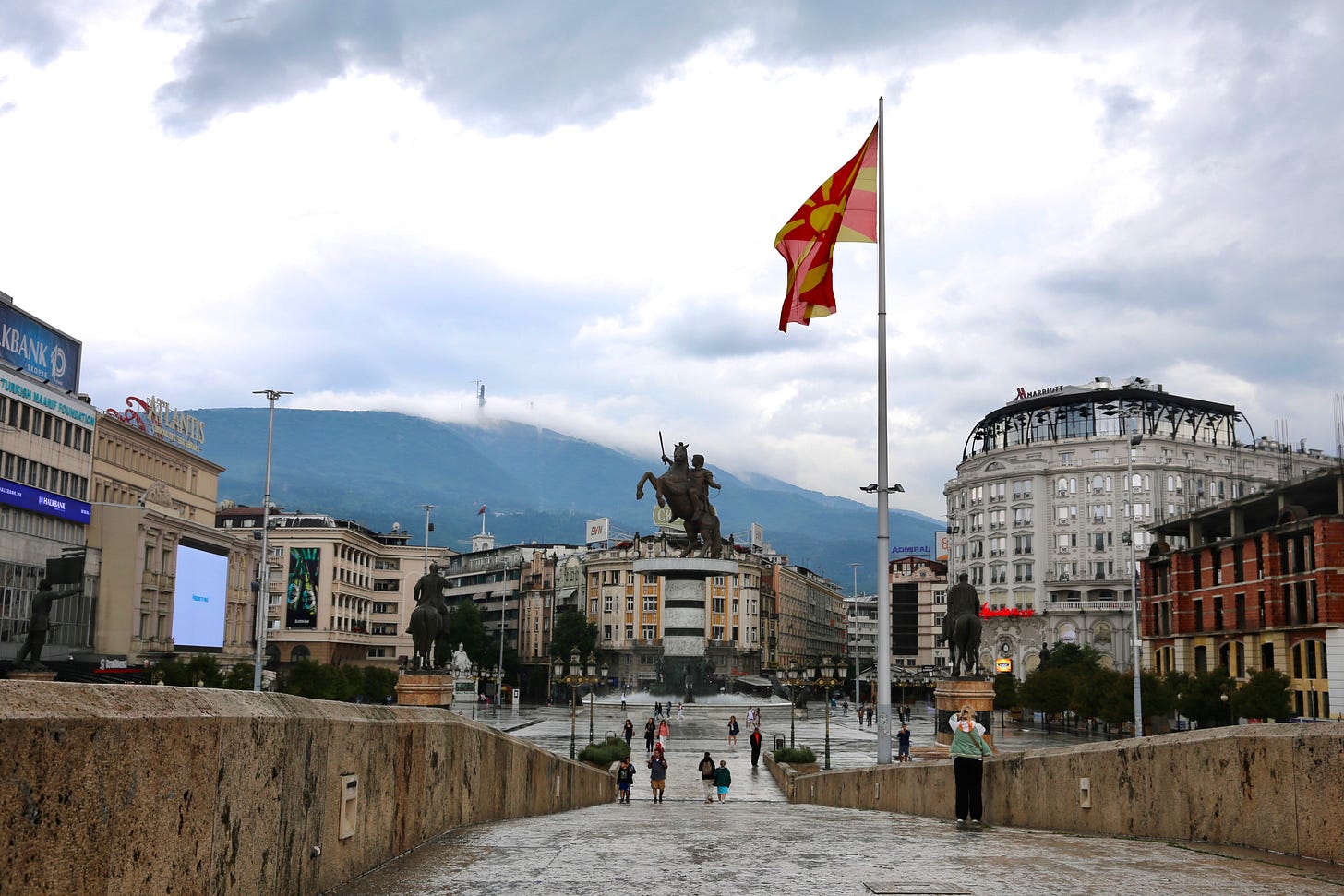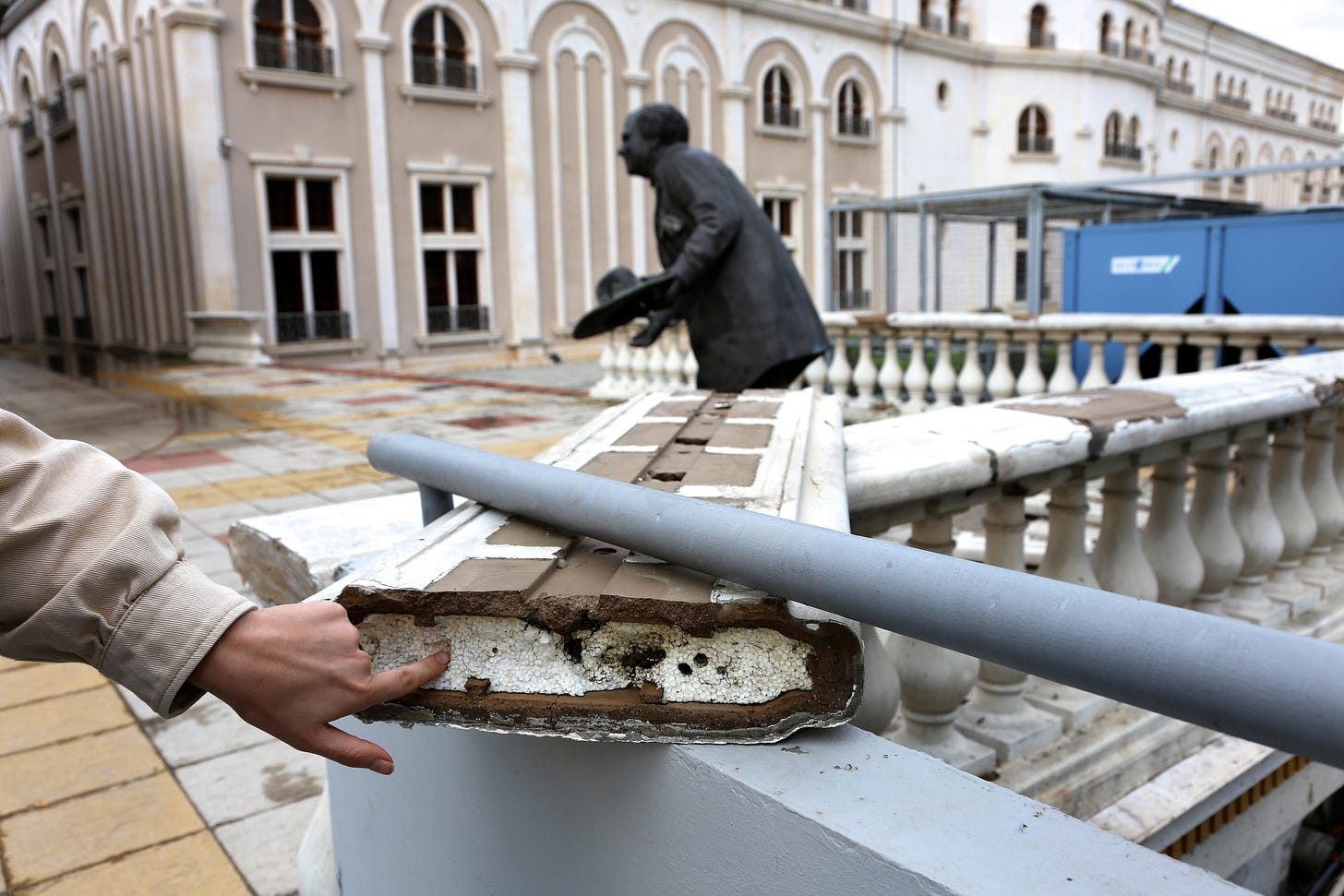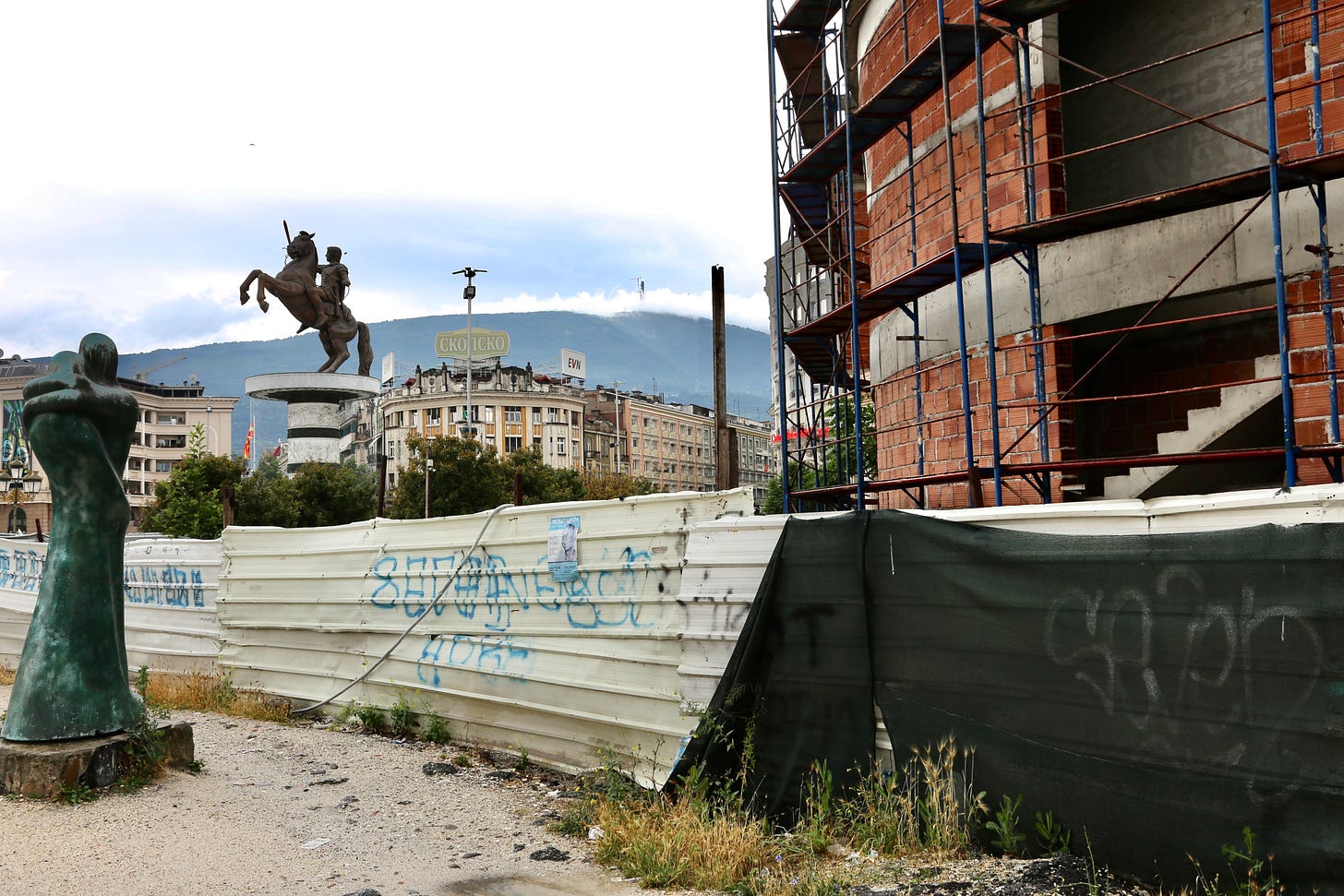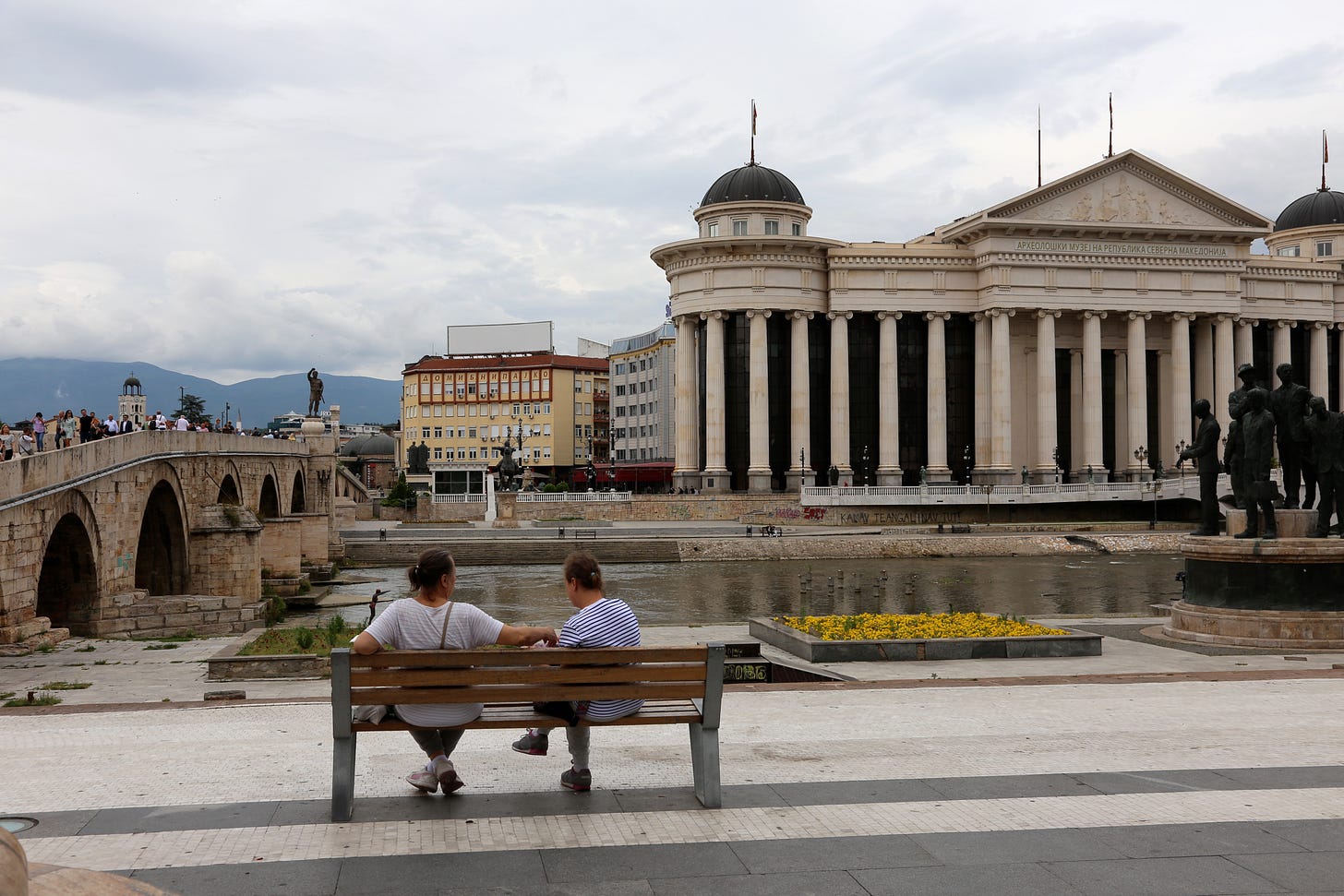S5E3. Why Macedonian nationalists love Hellenism
The new right-wing government has announced the resumption of the contested ‘Skopje 2014’ project aimed at the urban transformation of the capital city. While tensions with neighboring countries rise
Dear reader,
welcome back to BarBalkans, the newsletter with blurred boundaries.
Have you ever paid attention to the architectural style(s) that shape the urban design of your city?
Maybe, maybe not. But if they changed radically from one year to the next, wouldn’t it be shocking?
This clearly demonstrates that politics is not distant from the lives of citizens. Politicians' decisions directly impact our everyday lives. From the laws we follow to the streets we walk on.
If this sounds like mere fantasy or speculation, one European city has already faced such dramatic architectural changes. And now, driven by strong nationalist sentiments of the new government in power, the urban planning has returned to the top of the national political agenda.
We are talking about Skopje, the capital city of North Macedonia. A city known for its many neoclassical/Hellenistic-style monuments, plaques, bridges and buildings.
What is the ‘Skopje 2014’ project
In 2010, the right-wing nationalist party VMRO-DPMNE (Democratic Party for Macedonian National Unity), led by then Prime Minister Nikola Gruevski, announced the intention to rebuild part of the capital city - destroyed in the 1963 earthquake - in a neoclassical, Hellenistic style.
The neoclassical style in architecture refers to the revival of classical forms (such as Doric, Ionic, and Corinthian columns), the use of marble and geometric patterns. Hellenization refers to the cultural assimilation into the historical and mythological imagery spanning from Alexander the Great’s conquests in the 4th century BC to the Roman Empire’s establishment.
For Macedonian nationalists, this antiquization policy is politically significant, as it aims to create a distinct national identity for a relatively young country, independent for just over 30 years.
In other words, the project links Macedonian national history back to the reign of Philip and Alexander the Great, with unbroken continuity to the present day.
The project was called ‘Skopje 2014’. Within four years, it led to the construction (or just the refurbishment of existing structures) of 136 monuments, statues, fountains, bridges, museums, theatres, public buildings and even Baroque-style vessels anchored in the Vardar River, used as cafés and restaurants.
The centerpiece of ‘Skopje 2014’ is the enormous Warrior on a Horse monument, standing 14.5 meters tall atop a 10-meter cylindrical column. This equestrian statue represents Alexander the Great, and at its base are eight bronze soldiers, eight bronze lions, and a large musical fountain.
The cost of the entire project was 700 million dollars, which exceeded the allocated budget by over 200 million. It quickly sparked controversy for a number of reasons, including:
The waste of public resources in a country facing major industrial and employment issues.
The use of poor quality materials, which led to visible deterioration over time.
Its kitsch aesthetic, reminiscent of a mini-Las Vegas, as many architects and urban planners criticized.
The nationalistic ideology that permeated the project, with the aim of strengthening VMRO-DPMNE’s power and leaving a clear imprint on Skopje’s urban landscape.
The attempt to marginalize the Greek, Bulgarian and Albanian communities in the country, elevating the Macedonian majority to the central role in constructing national identity.
The risk of increasing political tensions with Greece and Bulgaria (both EU Member States) over purely identity-related issues.
This is why, after the new government took power in 2017, the coalition led by the Social Democrats blocked the ‘Skopje 2014’ project. Construction of new buildings was cancelled, while some controversial monuments were removed and maintenance largely suspended.
The bet of the new government
Ten years after the ‘Skopje 2014’ goal, as of May 2024, VMRO-DPMNE has returned to power, controlling both the government and the presidency of North Macedonia. The nationalist right-wing party immediately made it clear that it had not distanced itself from any part of its past, including its approach to urban planning.
Less than two months after assuming office, in mid-August, Prime Minister Hristijan Mickoski announced that his government would focus on completing what remained unfinished from the project, in the same pompous neoclassical and Hellenistic style:
“I don’t want to discuss tastes. But the situation now is too ugly, as it looks unfinished. We are looking for a way to complete a large number of those buildings. I want them completed as soon as possible, so they no disfigure the appearance of the capital by being left unfinished”.
According to Prime Minister Mickoski, the project will not be relaunched immediately, as funds “will be provided in the next budget”, in 2025. Furthermore, the legal status of the unfinished buildings must be addressed, as some have been acquired by private individuals and companies.
Further details have not been disclosed.
However, this initial announcement from the Macedonian Prime Minister suggests that the push for a monolithic national identity, rooted in the era of Alexander the Great, remains strong.
And this raises concerns about the potential impact on international relations with neighboring countries.
Black clouds on the horizon
What might seem a relatively minor issue - the completion of the urban planning project in Skopje - takes on a completely different significance when analyzing the political landscape in the region and the implications for North Macedonia’s European path.
The use of Hellenistic imagery is a clear political stance that relates directly to the name of the country: why is it ‘North Macedonia’ and not just ‘Macedonia’?
This has been a particularly thorny issue in relations with Greece since the independence of the former Yugoslav Republic in 1991. According to the Greek authorities, the term ‘Macedonia’ (without ‘North’) is unacceptable for two main reasons:
‘Macedonia’ is not only a State, but also a Greek macro-region divided into three administrative regions: West, Central, and East Macedonia.
‘Macedonia’ encompasses the historical and cultural heritage associated with the Macedonian reign of Philip and Alexander the Great, claimed as exclusive by both countries.
The history of Skopje-Athens relations was characterized by severe Greek embargoes and vetoes until 12 June 2018, when then Greek Prime Minister Alexis Tsīpras and then Macedonian Prime Minister Zoran Zaev signed the Prespa Agreement, ending the tension between the two countries.
The ‘Republic of Macedonia’ became ‘Republic of North Macedonia’. In exchange for renouncing the use of the Verghina Sun - the symbol of the Macedonian royal dynasty - it was granted the recognition of the Macedonian language and the green light to join NATO and the European Union.
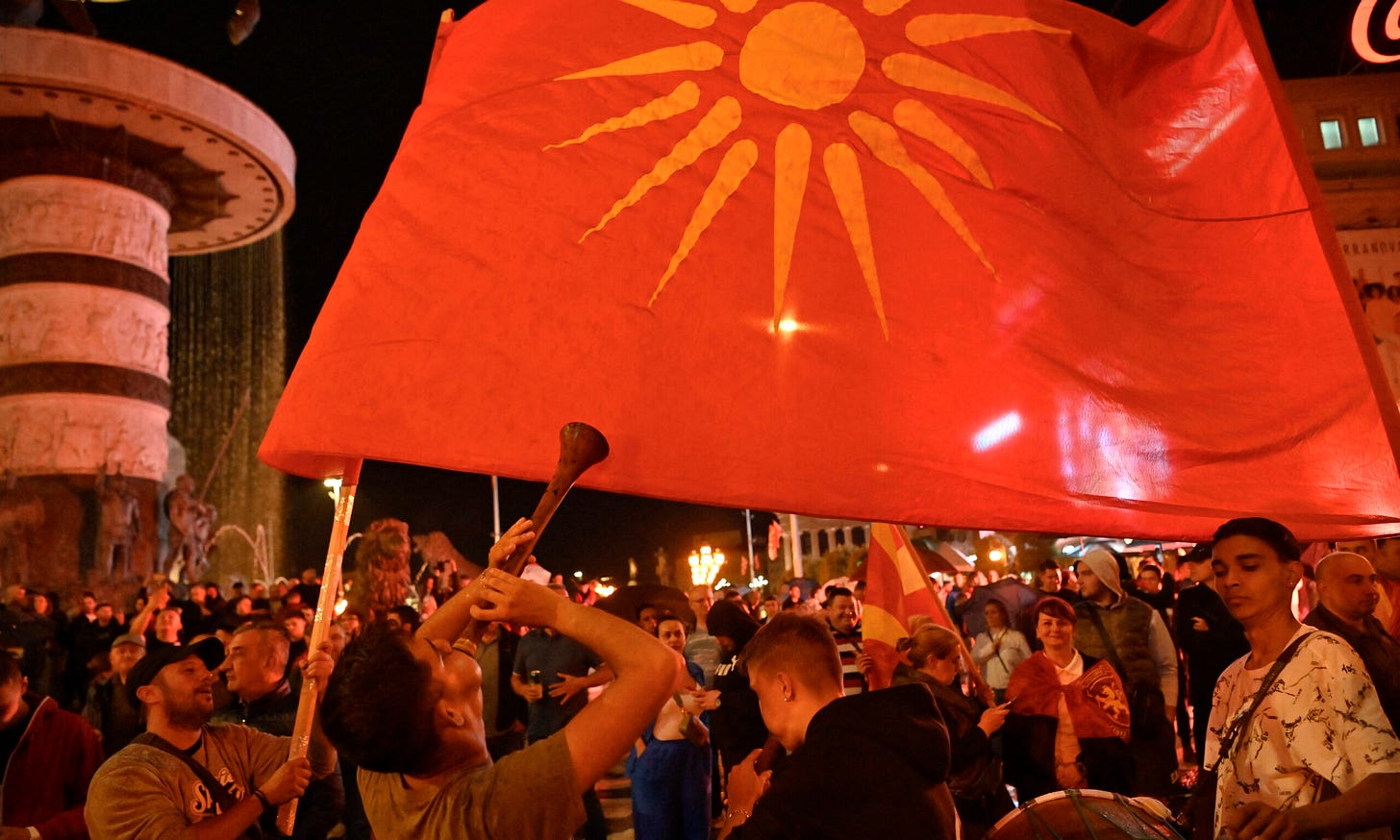
Since Macedonian nationalists returned to power in 2024, the political climate has shifted once more.
First, Gordana Siljanovska-Davkova, on the day she was sworn in as President of the Republic on May 12, intentionally and repeatedly referred to her country as ‘Macedonia’, not ‘North Macedonia’. The newly appointed Prime Minister Mickoski did the same during his government’s inauguration on June 23.
The Greek Ministry of Foreign Affairs condemned Skopje’s new institutional posture, calling it “a flagrant violation of the Prespa Agreement and the Constitution of our neighboring country”. Even the EU institutions warned about the necessity of “respecting binding agreements”.
But this is not all.
The worsening of relations with Greece coincides with the intransigent attitude of Macedonian nationalists toward Bulgaria, another EU Member State involved in political tensions with Skopje in the recent past.
Regarding the constitutional recognition of the Bulgarian minority in North Macedonia (required by agreements to join the European Union), Prime Minister Mickoski stated that “it will not pass, and there will be no constitutional changes as long as I am here”.
Clearly, this is a turning point that could halt EU accession negotiations, two years after the end of the Bulgarian veto that had blocked the path of North Macedonia between 2020 and 2022.
In order to open Cluster 1 of the EU negotiating framework, not only a series of reforms are needed - from the judiciary to public procurement, to the fight against corruption - but also the amendments to the Constitution that the Mickoski government refuses to implement.
This represents another huge risk for the intransigent policy of the Macedonian nationalists. Hidden behind the Hellenistic facades of the yet-to-be-completed buildings in Macedonia Square.
Pit stop. Sittin’ at the BarBalkans
We have reached the end of this piece of the road.
Considering the role of Hellenism in the cultural imagination of nationalists in North Macedonia, today we find a legend and a bottle of wine at our bar, the BarBalkans.
According to some historical interpretations, the main cause of Alexander the Great’s death at the age of 33 was likely alcoholism, after adopting the Persian custom of drinking undiluted strong wine. Excessive consumption of strong wine may have led to liver cirrhosis.
The wine we are drinking is the renowned vranec - not to be confused with the Montenegrin vranac - a full-bodied red wine with a high residual sugar content.
Vranec is made from the black kratošija grapes, among the most renowned in the region, cultivated on Macedonian soil since the Hellenistic period, when it was stored in large clay amphorae.
Let’s continue BarBalkans journey. We will meet again in two weeks, for the 4th stop of this season.
A big hug and have a good journey!
If you have a proposal for a Balkan-themed article, interview or report, please send it to redazione@barbalcani.eu. External original contributions will be published in the Open Bar section.
The support of readers who every day gives strength to this project - reading and sharing our articles - is also essential to keep BarBalkans newsletter free for everyone.
Behind every original product comes an investment of time, energy and dedication. With your support BarBalkans will be able to elaborate new ideas, interviews and collaborations.
Every second Wednesday of the month you will receive a monthly article-podcast on the Yugoslav Wars, to find out what was happening in the Balkans - right in that month - 30 years ago.
You can listen to the preview of The Yugoslav Wars every month on Spreaker and Spotify.
If you no longer want to receive all BarBalkans newsletters (the biweekly one in English and Italian, Open Bar external contributions, the monthly podcast The Yugoslav Wars for subscribers), you can manage your preferences through Account settings.
There is no need to unsubscribe from all the newsletters, if you think you are receiving too many emails from BarBalkans. Just select the products you prefer!




